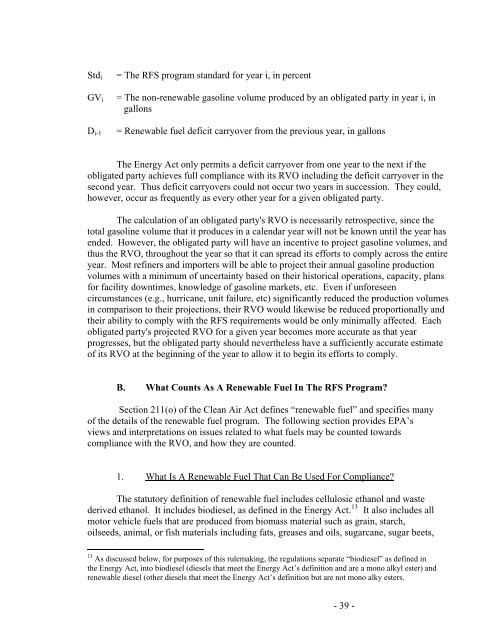Regulation of Fuels and Fuel Additives: Renewable Fuel Standard ...
Regulation of Fuels and Fuel Additives: Renewable Fuel Standard ...
Regulation of Fuels and Fuel Additives: Renewable Fuel Standard ...
Create successful ePaper yourself
Turn your PDF publications into a flip-book with our unique Google optimized e-Paper software.
Stdi = The RFS program st<strong>and</strong>ard for year i, in percent<br />
GVi = The non-renewable gasoline volume produced by an obligated party in year i, in<br />
gallons<br />
Di-1<br />
= <strong>Renewable</strong> fuel deficit carryover from the previous year, in gallons<br />
The Energy Act only permits a deficit carryover from one year to the next if the<br />
obligated party achieves full compliance with its RVO including the deficit carryover in the<br />
second year. Thus deficit carryovers could not occur two years in succession. They could,<br />
however, occur as frequently as every other year for a given obligated party.<br />
The calculation <strong>of</strong> an obligated party's RVO is necessarily retrospective, since the<br />
total gasoline volume that it produces in a calendar year will not be known until the year has<br />
ended. However, the obligated party will have an incentive to project gasoline volumes, <strong>and</strong><br />
thus the RVO, throughout the year so that it can spread its efforts to comply across the entire<br />
year. Most refiners <strong>and</strong> importers will be able to project their annual gasoline production<br />
volumes with a minimum <strong>of</strong> uncertainty based on their historical operations, capacity, plans<br />
for facility downtimes, knowledge <strong>of</strong> gasoline markets, etc. Even if unforeseen<br />
circumstances (e.g., hurricane, unit failure, etc) significantly reduced the production volumes<br />
in comparison to their projections, their RVO would likewise be reduced proportionally <strong>and</strong><br />
their ability to comply with the RFS requirements would be only minimally affected. Each<br />
obligated party's projected RVO for a given year becomes more accurate as that year<br />
progresses, but the obligated party should nevertheless have a sufficiently accurate estimate<br />
<strong>of</strong> its RVO at the beginning <strong>of</strong> the year to allow it to begin its efforts to comply.<br />
B. What Counts As A <strong>Renewable</strong> <strong>Fuel</strong> In The RFS Program?<br />
Section 211(o) <strong>of</strong> the Clean Air Act defines “renewable fuel” <strong>and</strong> specifies many<br />
<strong>of</strong> the details <strong>of</strong> the renewable fuel program. The following section provides EPA’s<br />
views <strong>and</strong> interpretations on issues related to what fuels may be counted towards<br />
compliance with the RVO, <strong>and</strong> how they are counted.<br />
1. What Is A <strong>Renewable</strong> <strong>Fuel</strong> That Can Be Used For Compliance?<br />
The statutory definition <strong>of</strong> renewable fuel includes cellulosic ethanol <strong>and</strong> waste<br />
derived ethanol. It includes biodiesel, as defined in the Energy Act. 13 It also includes all<br />
motor vehicle fuels that are produced from biomass material such as grain, starch,<br />
oilseeds, animal, or fish materials including fats, greases <strong>and</strong> oils, sugarcane, sugar beets,<br />
13 As discussed below, for purposes <strong>of</strong> this rulemaking, the regulations separate “biodiesel” as defined in<br />
the Energy Act, into biodiesel (diesels that meet the Energy Act’s definition <strong>and</strong> are a mono alkyl ester) <strong>and</strong><br />
renewable diesel (other diesels that meet the Energy Act’s definition but are not mono alky esters.<br />
- 39 -
















